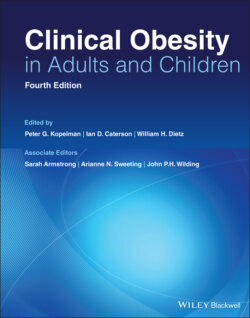Читать книгу Clinical Obesity in Adults and Children - Группа авторов - Страница 59
Epigenetics
ОглавлениеMuch attention has been directed towards the role of epigenetic mechanisms. Epigenetics is a term used to describe mechanisms that alter gene activity without changing the DNA sequence. The most common mechanisms include changes in DNA methylation, histone modifications, and small noncoding RNAs. To date, the most frequently studied has been DNA methylation.
Most studies in humans addressing epigenetic mechanisms have focused on changes in DNA methylation in clinically accessible tissue, most commonly white blood cells rather than more metabolically relevant tissues. However, changes in white blood cell methylation have been observed in response to a number of in utero exposures. For example, a study of individuals currently in their sixties but exposed in utero to the Dutch Hunger Winter demonstrated altered methylation at a number of loci known to be involved in growth and metabolism [107]. Investigators in the Pregnancy and Childhood Epigenetics Consortium meta‐analyzed the association between pre‐pregnancy maternal BMI and methylation at over 450,000 sites in newborn blood DNA across 19 cohorts (9340 mother‐newborn pairs) [108]. In newborns, after adjustment for cell proportions, maternal BMI was associated with small methylation variation at 86 sites throughout the genome. At 72/86 sites, the direction of the association was the same in newborns and adolescents, suggesting the persistence of signals. In addition, epigenome‐wide analyses of blood from children at two different ages identified changes in DNA methylation that were associated with exposure in utero to maternal obesity and/or gestational diabetes [109]. However, changes in methylation were generally small in all analyses (<5%). Epigenome‐wide analysis has also identified changes in cord blood DNA methylation that are associated with maternal smoking during pregnancy. In one study, methylation of the locus GFI1 explained 12–19% of the reduction in birth weight resulting from maternal smoking [110]. Another study identified differences in placental methylation at seven sites that mediated the association between prenatal smoking and birth weight [111].
Studies in animal models have allowed the effects of changes in the early environment to be studied in metabolically relevant tissues. Although such studies enable causal effects of in utero exposures on the offspring epigenome to be determined, conclusions regarding the causal effects of specific epigenetic changes on the phenotypic outcome (e.g. offspring obesity) cannot be made. A study in rats demonstrated that high‐fat diet feeding during pregnancy caused hypermethylation of the promoter of POMC in the arcuate nucleus of the hypothalamus of the offspring, which was associated with increased feeding in response to a high‐fat diet [112].
